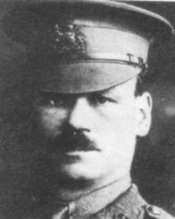Henry James Knight
Henry James Knight VC (5 November 1878 – 24 November 1955) was an English recipient of the Victoria Cross, the highest and most prestigious award for gallantry in the face of the enemy that can be awarded to British and Commonwealth forces.
James Huntley Knight (Enlisted: Henry James Knight) | |
|---|---|
 | |
| Born | 5 November 1878 Yeovil, Somerset |
| Died | 24 November 1955 (aged 77) Anderson, Dorset |
| Buried | Bournemouth Crematorium (Memorial at Millborne St Andrew Church, Dorset) |
| Allegiance | |
| Service/ | |
| Years of service | 1892 - 1911, 1914 - 1917 |
| Rank | Captain |
| Unit | The King's (Liverpool) Regiment Royal Fusiliers Manchester Regiment |
| Battles/wars | Second Boer War World War I |
| Awards | Victoria Cross |
Details
Born in Yeovil, Somerset (Born James Huntley Knight, Enlisted Henry James Knight) he was 21 years old, and a corporal in the 1st Battalion, The King's (Liverpool) Regiment, British Army during the Second Boer War when the following deed took place for which he was awarded the VC. The full citation was published in the London Gazette of 4 January 1901 and reads:[1]
War Office, January 4, 1901.
THE Queen has been graciously pleased to signify Her intention to confer the decoration of the Victoria Cross on the undermentioned Non-Commissioned Officer, whose claims have been submitted for Her Majesty's approval, for his conspicuous bravery during the operations near Van Wyk's Vlei, as stated against his name :—
1st Battalion Liverpool Regiment. No. 1 Company, 4th Division Mounted Infantry
Corporal H. J. Knight
On the 21st August, during the operations near Van Wyk's Vlei, Corporal Knight was posted in some rocks with four men covering the right rear of a detachment of the same Company who, under Captain Ewart, were holding the right of the line.
The enemy, about 50 strong, attacked Captain Ewart's right and almost surrounded, at short range, Corporal Knight's small party. That Non-Commissioned Officer held his ground, directing his party to retire one by one to better cover, where he maintained his position for nearly an hour, covering the withdrawal of Captain Ewart's force, and losing two of his four men.
He then retired, bringing with him two wounded men. One of these he left in a place of safety, the other he carried himself for nearly two miles.
The party were hotly engaged during the whole time.
Further information
He later achieved the rank of captain in the Manchester Regiment. His Victoria Cross is displayed at the Museum of the King's Regiment, Liverpool, England.
References
- "No. 27263". The London Gazette. 4 January 1901. p. 81.
- Monuments to Courage (David Harvey, 1999)
- The Register of the Victoria Cross (This England, 1997)
- Victoria Crosses of the Anglo-Boer War (Ian Uys, 2000)